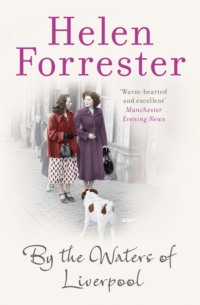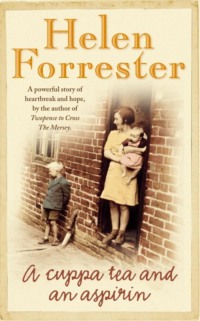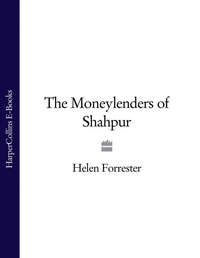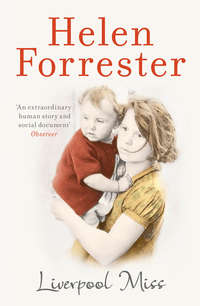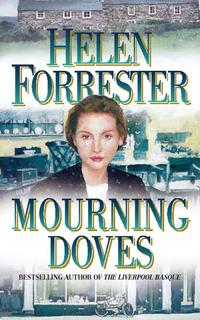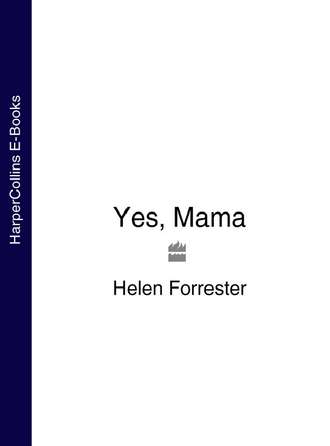
Полная версия
Yes, Mama
Her chest aching, her throat parched, her heart beating wildly from fright, Polly followed the old man along a dark passage and up two flights of stairs equally Stygian. ‘You’re lucky,’ he piped. ‘Mistress don’t bother with the likes of you that often.’
Polly kept her head down and did not answer. Surreptitiously, under her shawl, she scratched a bug bite on her arm. She was so inured to vermin bites that they did not usually irritate. Her mother had, however, insisted that she wash herself all over in a bucket of cold water, scrubbing her yellowed skin with a rough piece of cloth. It had made her itch. After that, both of them had gone over the seams of her clothes to kill any lice or bugs that she might be carrying. ‘You can’t help your hair,’ her mother had said. ‘I haven’t got no money to buy paraffin to kill the nits in it.’
The old servant pushed open a green baize door and suddenly she was in a blaze of sunlight coming through the stained glass of the hall window.
Blinking against the light, she tiptoed after the servant across the hall rug to a white-enamelled door.
The servant knocked gently, paused and then entered the room, while Polly, terrified, quivered on the red Turkey doormat.
‘Come on in,’ the old man breathed irritably. ‘She’s waitin’.’ He shoved Polly forward and closed the door behind her.
Before she lowered her eyes, Polly caught a glimpse of an incredibly thin woman, her heavy white hair done up elaborately on the top of her head. She was waiting bolt upright in an armless chair and was staring out of the window at the garden. Nestling in the folds of her grey silk skirt was a huge white cat. Heavily ringed fingers tickled the cat’s ears.
Polly stood silently looking at the richly patterned carpet, and waited to be noticed.
‘Well?’ the old lady barked.
Polly swallowed and then curtsied. She wanted to run away and cry, cry herself to death, if possible. ‘I’m Polly, Ma’am,’ she quavered, ‘wot used to scrub your steps and do the brass …’
‘I know who you are,’ snapped the voice. ‘What do you want?’
Polly glanced up at her erstwhile employer. The lady was still staring out of the window; the cat stared at Polly. ‘Well, Ma’am, I – er …’
‘For Heaven’s sake, speak up, girl.’
‘Yes, ’m, I’m wantin’ to get a job as wet-nurse to a lady called Mrs Woodman in Upper Canning Street – and I was wonderin’, Ma’am, if you would write a letter to her about me.’
‘A reference?’
‘Yes, Ma’am.’
‘A wet-nurse, humph? Have you been in trouble? I don’t believe in helping servants in trouble.’
‘Oh, no, Ma’am.’ Polly was shocked out of her fear. ‘I were a married woman.’ Her voice faltered, and for the first time, Mrs Stanley turned to look at her.
‘Lost the child?’
‘Yes, Ma’am. He was born a bit early – ’cos me ’oosband were killed – in the Albert Dock, Ma’am. It must’ve bin the shock.’ She gulped back her tears, and then went on. ‘’E fell in an ’old, Ma’am.’
‘How very careless of him.’
‘Yes, ’m.’ Tears coursed down the girl’s cheeks.
Madam stared at her thoughtfully. Everybody lost children; she had lost all hers. Still, it was depressing. And doubtless Mrs Woodman, whom she had met once or twice at parties, would be glad of a wet-nurse. She understood that, nowadays, they were difficult to obtain.
‘Have you been in service before?’
‘Yes, Ma’am. I were a tweenie when I were ten, ’elping the ’ousemaid empty the slops, and like. The Missus died … and then I found I could earn more specializin’ in doin’ doorsteps.’
‘Humph.’ Mrs Stanley’s lips curled. The lower classes were remarkable in their ability to survive.
‘And for how long did you – er – clean my doorsteps?’
‘Five year, Ma’am.’
‘Why don’t you go back to it?’
Polly heaved a sigh. She was so tired that she thought her legs would give under her. ‘Me Mam wants me to improve meself,’ she burst out, with sudden inspiration.
‘Very commendable. And do you go to Church, Polly?’
Polly had never been to Church in her life. And only once to an open air Wesleyan meeting with her father. She knew, however, what the answer must be. ‘Oh, yes, Ma’am. I go to St Nick’s – I mean, St Nicholas’s.’
‘Humph. Protestant, then?’
‘Yes, Ma’am,’ replied Polly promptly, wondering suddenly what she really was, since her mother was a Roman Catholic and her father a Wesleyan.
‘Mrs Woodman is a Protestant, I believe.’
Polly did not care if Mrs Woodman worshipped golden idols, like the blackie seamen who walked the streets of Liverpool in silent, single files. All she wanted was three meals a day, to lessen the pain in her stomach, and a baby to suckle, to ease the pain in her chest; even the thought of suckling made her breasts fill and she could feel the milk trickling down to her waist.
Mrs Stanley smiled thinly. She did not care for Mrs Woodman, a fluttering widgeon of a woman with an upstart husband who dabbled in many commercial enterprises in Liverpool. Distinctly lower-class. She thought it might be amusing to send them a wet-nurse who was probably lice-ridden.
‘Bring my desk from over there and put it on this table beside me.’ Mrs Stanley gestured towards the far wall.
Polly did not know what a desk looked like and glanced, bewildered, towards the furniture indicated by the delicate white hand.
‘There, you fool – that – er – sloping box.’
Polly carefully lifted a pair of crystal inkwells and a matching candlestick off the desk and laid the desk on the table indicated. She then replaced the inkwells and candlestick.
Irritated, Mrs Stanley moved inkwells and candlestick to the back of the desk, so that she could open the lid and extract a sheet of paper, a goose-quill pen and a piece of sealing wax. In exquisite copperplate, she wrote To Whom It May Concern that Polly Ford was honest, industrious and had worked for her as a charwoman for five years. She was desirous of improving herself, and Mrs Stanley felt that she would give satisfaction.
She sanded the paper to dry the ink. She then took a phosphorus match from the candlestick, struck it and lit the candle. She held the stick of sealing wax to the flame and allowed a small drop to fall upon the letter and seal it closed. Into the molten wax, she pressed a ring from her forefinger, to imprint her own seal.
‘There.’ She turned in her chair and handed the note to Polly. With a bit of luck, that would give the odious Woodmans a fair amount of trouble.
‘Oh, thank you, Ma’am.’ Polly’s voice was full of genuine gratitude as she made a deep curtsey.
Mrs Stanley gave a stiff nod of acknowledgement, and then ordered, ‘Put the desk back on to the far table.’
‘Yes, ’m.’ Polly did as she was bidden, being particularly careful not to spill the red and black inks from their crystal containers. She then backed to the door, bobbing little curtsies as she went.
‘James will show you out. Pull the bell by the fireplace.’
The only thing by the fireplace which could be pulled was a long piece of embroidered canvas hanging from the ceiling. Polly hoped for the best and pulled it. Then she stood with hands neatly clasped in front of her and examined the pattern on the carpet. She was stupid, she told herself. She should have realized that she would have to be escorted out of the house in case she stole something. Not that I would, she told herself crossly.
The old manservant arrived with commendable promptness. ‘Yes, Ma’am?’
‘Show this woman out – by the servants’ entrance.’
‘Yes, Ma’am. Of course, Ma’am.’ He twisted his toothless mouth into a tight knot. As if he would ever show a member of the lower classes out of the front door. After fifty years of service, Madam ought to know that, he thought irritably.
II
Sent upstairs by Rosie, Polly stood with head meekly bowed and examined the blue and white Chinese carpet in Elizabeth. Woodman’s room, while her new mistress looked her over for a second time.
The young woman seemed healthy enough; and with a reference from the high-and-mighty Mrs Stanley and a personal recommendation from her cook-housekeeper, Mrs Tibbs, she should be satisfactory. Yet, Elizabeth smelled a rat. Mrs Stanley was notorious for her perverted sense of humour. A leftover from the wilder days of King George IV and King William IV, the old devil was capable of all kinds of japes and capers.
As she peered in the candlelight at the humbly bent head, a much sharper pain shot through her and she cried out. Mrs Macdonald came to the bedside immediately. She picked up the rolling-pin from the bedside table and handed it to the sufferer. ‘There, there, Ma’am. Hold on to this.’
Elizabeth clutched at the pin and gritted her teeth, as she waited for the next pang. She felt tired already, worn out from worrying over the coming child’s existence. She was petrified at the thought of the outburst which might occur from Humphrey when he actually saw the baby.
But if she employed this Polly Ford, the child could stay in the old nurseries on the top floor for months, and as far as Humphrey was concerned, out of sight might be out of mind. And she herself would be freed from the boredom of feeding the baby. She could go out and fulfil her social obligations, be free to spend afternoons with darling Andrew, as before, though they would have to be much more careful.
She let another spasm go over, managing not to cry out. Then she said to the midwife, ‘Mrs Macdonald, tell Mrs Tibbs to see that this woman is bathed, her head rubbed with paraffin, and her present clothing wrapped up tightly and sent to her home. Mrs Tibbs should have her uniform ready by now.’
‘Yes, Ma’am. I’ll ring for Rosie.’
Polly kept her head down. This was much better than she had expected. Both she and her mother had been worried about getting her a uniform, fearing that the pedlar might not give them credit. Now the clothes were to be given to her. If she had dared, she would have sighed with relief.
Elizabeth knew from sad experience that vermin could come into a house in a servant’s trunk. She took no chances and always provided uniforms.
Polly endured without comment the humiliating complaints of her fellow servants, as a tin bath was lugged up to the windowless box room which would be her bedroom. Loquacious Fanny hauled two ewers of hot water and one of cold up the endless stairs from the basement kitchen, together with a bottle of paraffin, a bar of laundry soap, a piece of flannel and a worn bath towel. ‘Mind you don’t make no splashes,’ she warned Polly.
Polly had never had a bath in her life; she had simply rubbed herself cursorily with a bit of cloth wrung out in cold water. Now, Fanny laid an old copy of The Times on the floor and said, ‘Take off all yer clothes and put ’em on this. Mrs Tibbs’ll get next door’s gardener’s boy to walk down with ’em to yer ma’s.’
Polly looked at the girl appalled. Take off everything?
As if she could read her mind, Fanny said, with a grin, ‘Everythin’, ’cept yer stockin’s and boots – you’re to keep them.’
‘Well, you go away, Miss, while I does it,’ snapped Polly defiantly. Even Patrick had never seen her completely naked.
At the thought of Patrick, tears welled. Fanny saw them, and said sympathetically, ‘Don’t take on so. They did this to me when I coom. Fussy, the Mistress is – wash all of you every day, she allus says.’ She glanced up again at Polly, still standing uncertainly by the bath. ‘These days, I fancy a bath meself now and then – takes the aches out of yez. I’ll bet she’ll make you scrub your dairies every day.’ She nodded her head like a disapproving old woman. ‘Proper finick, she is.’
While she waited for Fanny to leave the room, Polly sat down and unlaced her boots. One of the bootlaces broke and she looked at it ruefully, wondering where she would get a halfpenny from to buy a new one. ‘What’s the Master like?’ she inquired carefully – her mother had warned her long ago, when she had been a ten-year-old tweenie in a big house, to keep out of the way of the men of the house.
‘Himself? Och, you don’t have to worry about him. He’s got a fancy woman downtown. Maisie – she’s the parlour-maid – says the woman keeps ’im exhausted!’ Fanny chortled and looked wickedly at Polly. Then she said more soberly, ‘They do say as once he got a maid in trouble and the Mistress sent her packing. Nowadays, he don’t even notice you’re there, though. He’s got a lousy temper, though. Just keep out of his way of an evening when he’s drunk.’
Polly digested this advice, and then, as Fanny picked up her empty ewer and moved towards the door, she asked, ‘What part of town do you come from?’
Fanny laughed. ‘I dunno, for sure. I got an auntie wot lives in Shaw’s Alley, but I coom ’ere from the Workie. I were born in there – and bloody glad I was to get out of it. At least the Mistress don’t beat you. It were me auntie that got on to you.’
‘Is your Mam still in the Workhouse?’
‘Not her. She died when I was only an itty-bitty kid. The Workie Gaffer hit her one day for something she said – and she lay down and I remember she were cold.’
Polly did not bother to ask her where her father was. In her experience, fathers often remained unknown. She sighed and said, ‘It must’ve bin proper hard for yez.’
Fanny’s eyes twinkled. ‘I wouldn’t give a dead farthin’ to go through it again,’ she replied forcefully. Swinging her empty ewer, she turned and plodded down the stairs to the basement.
Polly quickly stripped off her blouse, skirt and stockings. She put a cautious toe into the steaming water and then stepped into it. It felt comfortable, so she carefully lowered herself into it and reached for the soap lying on the floor. She took the hairpins out of her plaits and loosened her hair. She found that holding the hot flannel to her breasts eased the ache in them and she was able to expel some of her milk. It would be a day or two, she realized, before the baby would be able to suck, and, in the meantime, she must keep the milk coming.
After she had dried herself, she kneeled down by the bath and uncorked the bottle of paraffin. Holding her breath because of its smell, she rubbed it liberally into her damp hair, until it dripped into the bath. Then, using a fine-toothed comb which her husband, Patrick, had given her as a present, she combed the long, damp locks until she reckoned she had all the lice out; the paraffin would kill the nits, so, if she were lucky, she would be free of them.
Two full-skirted, ankle-length, cotton dresses with petticoats to go under them had been provided. In Polly’s eyes, the dresses were beautiful, far nicer than anything she had ever worn before; they had narrow, blue and white stripes. There were three large white aprons to wear over them and three white cotton bonnets to pin over her hair. To go out-of-doors, there was a navy-blue jacket, and a navy coif to go over the white caps.
She would have to find stockings and shoes for herself, and she wondered if her mother could prevail on the pedlar to let her have them on two months’ credit. Her first month’s wages would be appropriated by Mrs Tibbs, the cook-housekeeper, as her fee for getting her the job. As she thought about this, she replaited her hair and wound it into a neat bun at the back of her head.
When Fanny came back up the stairs, carrying a pair of slop pails in which to remove the bath water, she gaped at the newly created Nanny. ‘Well, I never,’ she exclaimed. ‘You look proper pretty.’
Her spirits revived, Polly gave the girl a playful cuff about the head for her impudence. Then she asked, ‘Wot time is servants’ meals?’
‘Breakfast at six-thirty, dinner ’alf-past eleven, tea at five. If Ma Tibbs is in a good mood, you get a bit o’ somethin’ afore bedtime – depends on wot’s left from the Master’s dinner. The Mistress isn’t mean, but Ma Tibbs is. She takes food to her sister’s house.’
‘I’m awfully hungry,’ admitted Polly, her voice trembling slightly.
‘Oh, aye. You could get a mug o’ milk or ale anytime you want – and I suppose I’ll ’ave to bring it up.’
She plunged her slop pail into the scummy bath water.
‘Bring me some milk and a piece of bread now,’ wheedled Polly. ‘There’s a pet. I’m clemmed.’
Fanny glanced up at her. ‘And the baby not even born yet?’ she teased.
‘Come on, Fanny. I’ll share it with yez.’
‘Well, seein’ as I know yez, I’ll ask for it.’
Chapter Three
I
At half-past eleven that warm May night, Alicia Beatrix Mary yelled her first impatient complaint in this world.
Dr Willis declared her a healthy child and Mrs Macdonald gave her her first bath. To ensure a flat, well-healed navel, a flannel binder was wound tightly round her stomach.
On a dresser lay a pile of baby clothes originally prepared for a brother, who, eight years before, had died within a month of his birth. Mrs Macdonald picked up a cotton napkin and one of terry towelling and enclosed Alicia in these. Then the child’s tiny arms were pushed into a flannel vest. A long cotton petticoat followed and then a flannel one, each tied at the front. Over all this went a fine white baby gown, frilled and embroidered and hemstitched in an Islington sweat shop. The long petticoats and gown were folded up over the protesting little feet, and she was finally wrapped in a warm, white shawl crocheted for her by her mother’s spinster friend and lifelong confidante, Miss Sarah Webb.
Almost smothered by the amount of clothing, Alicia carried her complaints to Humphrey Woodman.
Humphrey had been called from his booklined study by Dr Willis to inspect the new addition to his household and was uncertain, at first, whether he should go up. He had been startled when Maisie, the parlour-maid, had told him that his wife had commenced her labour. He had hoped to the last that his wife would miscarry, so that he would not have to face directly the fact of her infidelity.
Maisie was waiting, politely holding the door open for him, so he slowly pushed himself away from his desk and got up. As he straightened his velvet smoking jacket and gravely marched upstairs, a slow anger burned in him. He did not care a damn what Elizabeth did as long as she was discreet; but having a child at the age of forty was, alone, enough to interest the gossips and raise speculation.
Since Dr Willis and Mrs Macdonald were present, he kissed his wife dutifully upon her white cheek, and, afterwards, went to inspect the minute bundle lying in the frilly, draped cot which had served all his children.
His breath began to come fast as he gazed at the crumpled red face, and he seethed inwardly; at that moment he would have liked to murder Elizabeth and her lawyer, Andrew Crossing, whom he was fairly sure was the child’s father. Yet, in a sense, he also felt defeated. There was no question of his divorcing his wife; he must maintain his carefully built-up image of a well-respected city businessman with an impeccable home-life. To maintain society’s rigid proprieties, he would have to accept the baby as his. He knew it and he guessed that his wife was counting upon it – the sanctimonious bitch!
At the back of his mind, too, was the need to protect the future of his daughter, Florence, who was standing by him, bending over the little cot and tenderly touching her newborn sister with a careful finger. Florence was herself seven months pregnant. She was the wife of the Reverend Clarence Browning, a gentleman with small private means bent on a career in the church. A divorce between her parents, or even a separation, might put an end to his hopes of obtaining a bishopric one day.
Humphrey loved Florence. She was the only person to whom he showed any real affection. Her marriage portion had been as handsome as he could make it. Though at this moment he itched to beat her mother to death, he knew he would never make a single move that might injure his little Flo. When Alicia’s time came, however, he thought savagely, she would not get a penny out of him.
’isn’t she lovely, Papa?’ cooed Florence.
Humphrey continued to gaze expressionlessly at the crabbed little face, as he said politely, ‘Yes, my dear.’
While Dr Willis went to use the Woodmans’ magnificent new water closet, Mrs Macdonald stood, hands folded over her apron, at the foot of the bed, waiting for the series of visitors to pass. She would stay to nurse Elizabeth for a couple of days, before handing her over to her friend, Sarah Webb, to be cared for during the rest of her ten days’ lying-in.
As Humphrey turned to leave the room, he felt suddenly drained. His anger began to subside and he thought longingly of his Mrs Jakes. Most of his friends had a little woman tucked away somewhere in the town, and Mrs Jakes was his woman. Her well-patronized sweets and tobacco shop, on the corner of one of the crowded streets behind his office in Water Street, offered a fine excuse for visiting her. His need for tobacco for his pipe and the occasional gift of sweets for his children accounted easily for his going there. When the shop was empty of customers, he would slip behind the counter and through the door to her living-quarters. She would send her dull, thick-waisted daughter to tend the shop, lock the intervening door and draw the lace curtains over the window in it. They could be very cosy together behind the lace-draped door, sitting in front of her blazing coal fire; or they could go up the stairs which led to her bedroom above. It was a discreet, mutually agreeable arrangement. Why could not Elizabeth have been equally circumspect? he fumed.
Now, ignoring his wife, he said goodnight to Mrs Macdonald and told Florence to go to bed soon. Mrs Macdonald, much experienced in these matters, drew her own conclusions.
Downstairs, Humphrey waited in his study until the doctor should be shown in. Dr Willis, when he did come, accepted a glass of port and lifted it in a toast to the newborn. Humphrey bent his head slightly in acknowledgement, but he did not raise his glass. As Dr Willis drank from his glass, his eyebrows rose slightly – so his own wife’s gossip about Elizabeth Woodman had a sound basis. Woodman was showing none of the jovial relief at a safe delivery that most men exhibited. He hastily finished his wine, put down his glass and said that he would call again the following morning, to check both mother and child.
II
Upstairs, Mrs Macdonald was deferentially solicitous and wondered privately who would pay her bill. She said, as she fussed round her patient, ‘Miss Webb wondered if you would like a bite to eat, Ma’am?’
Sarah Webb, being a spinster, would not visit her friend until the morning; not having been married, she was supposed, officially, not to know how babies arrived. The following day seemed to her to be a polite time to come up. She had, meanwhile, taken over the housekeeping, and Mrs Tibbs had had a long, uncomfortable evening as Sarah began to cope with a kitchen unused to being visited by its mistress.
Florence reinforced the suggestion of food. She said, ‘Yes, Mama, you should take something to eat. You have to keep up your strength.’ Florence was deadly tired, her bundly body aching in every direction, but she spoke brightly to her mother.
‘Very well, dear,’ Elizabeth responded wearily. ‘Tell Mrs Tibbs to make me a plain omelette and toast – and some Madeira to drink.’
Mrs Macdonald pulled at the bell rope.
Elizabeth continued to talk to her daughter. ‘I have a wet-nurse for the child,’ she told her with a wan smile. ‘I don’t propose to feed her myself. At my age …’
Florence nodded understandingly. She had not been informed of her mother’s pregnancy until a week before the birth. Elizabeth had not felt able to tell a pregnant daughter that she was expecting an infant. At forty, it was indecent to be in such a situation; she herself had not expected it to happen.


